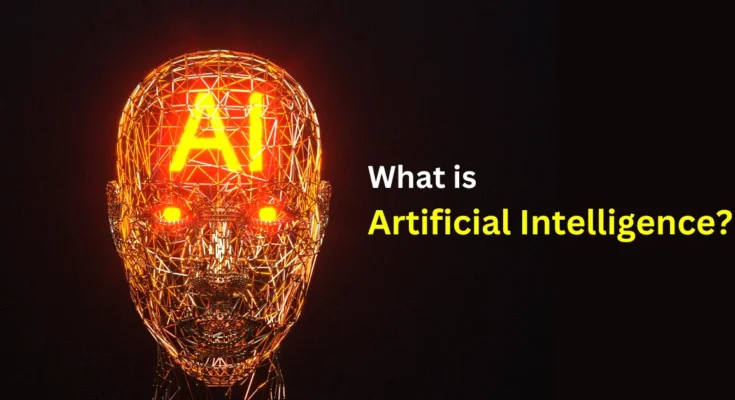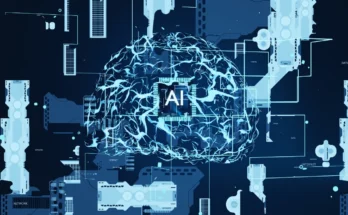Introduction: What is Artificial Intelligence?
Artificial intelligence, often abbreviated as AI, is a field of technology that has fascinated scientists, researchers, and innovators for decades. But what is artificial intelligence, exactly? In simple words, AI refers to the ability of machines to perform tasks that would typically require human intelligence. This includes learning, reasoning, problem-solving, and even creativity. The concept has rapidly moved from science fiction to reality, transforming industries and everyday life in remarkable ways.
In this blog, we’ll dive into the world of AI to answer the pressing question: What is artificial intelligence? We’ll break down complex concepts into understandable language, explore its impact on society, and provide examples of how AI is changing the future.
1. What is Artificial Intelligence? Breaking Down the Basics
Artificial intelligence can be a confusing term, especially since it encompasses a wide range of technologies and ideas. At its core, AI refers to machines designed to simulate human intelligence. These machines can think, learn, and adapt to new information just like humans, but often at much faster speeds and with greater accuracy.
Key Elements of AI
- Machine Learning (ML): A subset of AI, machine learning refers to systems that can automatically learn and improve from experience without being explicitly programmed. It’s the engine behind many AI applications.
- Natural Language Processing (NLP): NLP allows AI systems to understand, interpret, and respond to human language in a meaningful way. Think of chatbots or virtual assistants like Siri and Alexa.
- Robotics: AI is a driving force behind modern robotics, allowing machines to perform complex tasks in manufacturing, healthcare, and even space exploration.
- Generative AI: This is a form of AI that can create new content, such as images, music, and text, that mimics human creativity.
Artificial intelligence is not just about mimicking human behavior—it’s about improving and enhancing processes. The more data an AI system receives, the better it becomes at solving problems.
2. The Evolution of AI: From Fiction to Reality
The idea of artificial intelligence dates back to ancient times, with early myths and stories imagining artificial beings with human-like intelligence. However, the modern concept of AI started in the 20th century with the advent of computers.
Early Days of AI
AI’s journey began with the work of pioneers like Alan Turing, who proposed that machines could mimic human thought. His famous “Turing Test” became a foundational idea in AI research. By the mid-20th century, researchers developed the first computers capable of solving mathematical problems, and AI was born.
AI in Popular Culture
Movies like 2001: A Space Odyssey and The Terminator shaped how people imagined AI—often as a threat to humanity. While these fictional portrayals captured the imagination, real-world AI has taken a more beneficial path, aiding industries and improving lives.
Major Milestones in AI
- 1956: AI coined as a term by John McCarthy.
- 1997: IBM’s Deep Blue beats world chess champion Garry Kasparov.
- 2011: IBM Watson wins Jeopardy! against human champions.
- 2020s: AI is widely adopted in fields like healthcare, finance, and education.
3. Generative AI: The Future of Creative Intelligence
Generative AI is an exciting subfield of artificial intelligence that focuses on creating new content, such as art, music, and even fully-written articles, based on learned data patterns. This technology is reshaping industries by automating creativity, making it a buzzword in recent years.
What is Generative AI?
Unlike traditional AI, which works based on pre-programmed logic and data analysis, generative AI can create. It can compose music, write poems, design images, and even develop new scientific hypotheses. Its applications are vast, from generating marketing copy to creating realistic virtual worlds in video games.
Examples of Generative AI in Action
- Chatbots like GPT-4: Able to hold natural conversations and generate text-based content with human-like fluency.
- AI Art Generators: Programs that can produce original artwork in different styles based on user inputs.
- AI Music Creators: Tools that allow musicians to collaborate with AI to compose music.
Generative AI’s ability to create novel content is both exciting and, for some, a bit unsettling. Could AI one day replace human creativity? While it enhances and augments our creative abilities, it’s not poised to fully replace the human touch anytime soon.
4. AI Technology in Everyday Life: Practical Applications
Artificial intelligence is not some distant, futuristic technology—it’s already deeply integrated into our daily lives. From the moment you wake up and check your phone to when you ask Siri to set your alarm, AI is there, assisting you in ways you may not even notice.
AI in Smartphones
Today’s smartphones are packed with AI. Whether it’s face recognition unlocking your phone, AI-enhanced camera features improving your photos, or virtual assistants helping you manage your day, AI is all around you.
AI in Healthcare
AI plays a significant role in modern medicine. It helps doctors diagnose diseases, develop treatment plans, and even predict patient outcomes. AI-driven devices like smartwatches can monitor your health in real time, alerting you to potential problems before they become serious.
AI in Transportation
Autonomous vehicles, self-driving cars, and advanced traffic management systems are transforming transportation. These innovations reduce accidents, save time, and make travel more efficient.
AI in Retail
Online shopping experiences are also optimized by AI, with personalized recommendations based on your shopping habits. E-commerce giants like Amazon use AI to forecast demand, manage inventory, and improve customer service.
5. Ethical Considerations and Challenges of AI
As artificial intelligence continues to evolve and shape our world, ethical concerns have surfaced. These concerns are valid and must be addressed as AI technology becomes more sophisticated and embedded in daily life.
Key Ethical Issues
- Job Displacement: AI automation threatens to replace many jobs in industries such as manufacturing, logistics, and even some professional services. Will AI cause mass unemployment, or will it create new opportunities?
- Bias and Discrimination: AI systems are only as good as the data they’re trained on. If AI is fed biased data, it can perpetuate those biases in decision-making processes, such as in hiring or legal sentencing.
- Privacy Concerns: With AI capable of processing vast amounts of personal data, how can we ensure privacy? Surveillance systems powered by AI raise serious privacy issues that need to be regulated.
- AI Accountability: If an AI system makes a mistake, who is held responsible? Establishing accountability in AI-driven decision-making is crucial.
How to Mitigate Ethical Risks
- Promote transparency in AI systems.
- Develop regulations that ensure AI is used fairly and ethically.
- Encourage public discourse on AI’s impact on society.
6. The Future of AI: What’s Next for Artificial Intelligence?
Artificial intelligence is still in its early stages, and its potential for the future is enormous. From revolutionizing industries to helping solve complex global challenges, AI’s capabilities are expanding rapidly.
Trends to Watch in AI
- AI in Education: Personalized learning systems that adapt to each student’s needs are becoming more prevalent, helping to improve educational outcomes.
- AI in Climate Change: AI is being used to predict environmental changes and help find solutions to climate-related problems, from optimizing energy use to creating sustainable farming practices.
- Quantum AI: The next frontier may lie in quantum computing, where AI can process data at an unprecedented scale and speed.
- AI in Healthcare: With advancements in AI-driven diagnostics and robotic surgeries, healthcare could see a transformation in the coming years.
AI’s growth isn’t slowing down, and its future applications will likely touch every aspect of our lives, making the world more connected, efficient, and innovative.
Suggested Image Location: Include an image illustrating futuristic AI technologies, like quantum computers or advanced AI-powered robots.
FAQs
- What is artificial intelligence in simple words? Artificial intelligence is when machines are designed to think and learn like humans, making decisions based on data.
- What is generative AI?
Generative AI is a type of artificial intelligence that can create new content, such as text, images, or music, by learning from existing data. It mimics human creativity in producing original outputs. - How is AI used in everyday life?
AI is present in many daily tasks, from smartphone virtual assistants like Siri or Google Assistant to personalized recommendations on streaming services and e-commerce platforms. - Will AI take over jobs?
AI may automate certain tasks, potentially replacing some jobs, but it also creates new job opportunities in tech, AI development, and fields that require human creativity and emotional intelligence. - What are the ethical concerns of AI?
Some ethical concerns around AI include privacy violations, job displacement, bias in decision-making, and the lack of accountability when AI makes mistakes.
Final Words
Artificial intelligence is a transformative force that is reshaping industries, changing the way we live, and pushing the boundaries of technology. From simplifying tasks in our everyday lives to solving complex global problems, AI has the potential to improve our world in countless ways. While challenges like ethical considerations and job displacement remain, the future of AI is full of promise. The key is to embrace this technology thoughtfully, balancing innovation with responsibility.
AI is not just the future; it’s already here, and understanding its fundamentals will help you navigate the tech-driven world we live in. Keep learning, stay curious, and explore how AI can positively impact your life or business.




